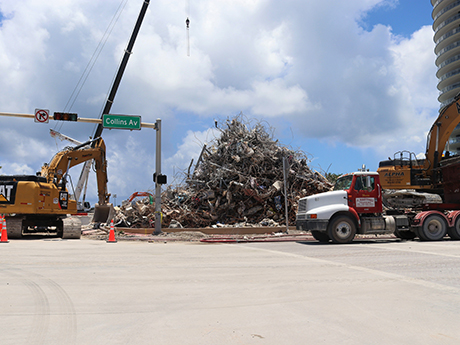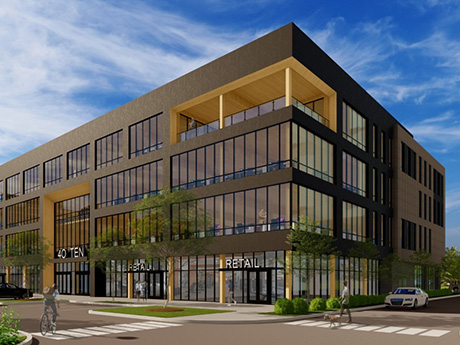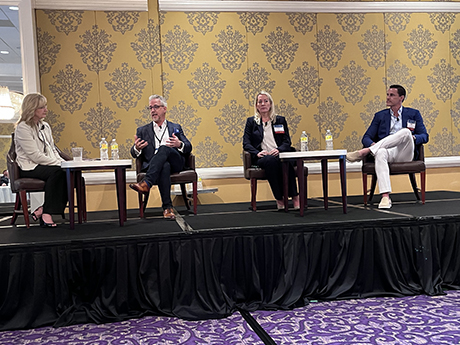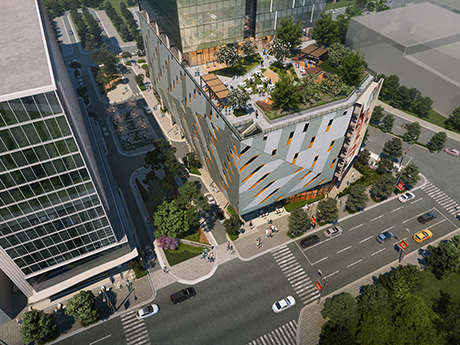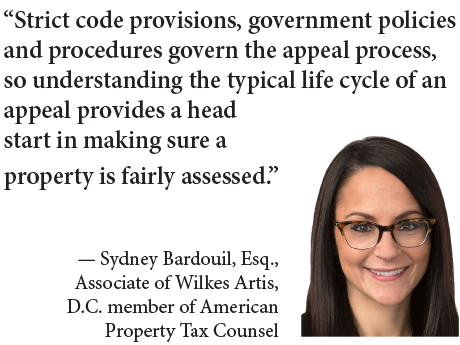By John Nelson The period between mid-June and mid-July has become a pivotal moment in the capital markets world as commercial real estate borrowers and lenders navigate inflation levels and interest rates not seen in decades. Scott Cook, commercial real estate market manager with TD Bank’s Charlotte office, says that borrowers and lenders are reshaping the market on the fly, and it’s too early to tell if the elevated capital costs are going to drastically suppress borrower demand. “We’re at an inflection point: the natural, healthy tension between borrowers and lenders where borrowers want more but lenders want to give less,” says Cook. “I don’t know that we’ve seen the full effect yet. Generally speaking, borrowers are still looking for business as usual. They’re aware of the rate hikes but still believe in the product, and certainly there’s overwhelming demand. We’re redefining it as we speak, it’s too early to call.” Cook says that the first true “wake up” call was when the U.S. Bureau of Labor Statistics (BLS) relayed that the Consumer Price Index (CPI), one of the standard inflation measurements that tracks price changes for goods and services, had increased 8.6 percent in May, which is the highest …
Southeast Feature Archive
One Year Later: Surfside Collapse Inspires Newly Passed Florida Legislation Addressing Structural Integrity
by John Nelson
By Jim Prichard of Ball Janik LLP The 13-story, L-shaped Champlain Towers decorated the Surfside coastline. In the early morning of June 24, 2021, the pool deck suffered a partial collapse, triggering more destruction in the structure’s central section and eastern wing. In less than 30 seconds, approximately half of the 136 units in the building were destroyed, leaving 98 residents dead and establishing a horrific legacy as one of the deadliest structural engineering failures in U.S. history. In the wake of the tragedy, Miami-Dade County Mayor Daniella Levine Cava ordered an immediate audit of all high-rise buildings that were more than 40 years old and five stories tall constructed by the developer. The attention to South Florida development prompted a review of hundreds of older buildings. There was also an onslaught of editorial investigations, including features by The New York Times, The Wall Street Journal and the Miami Herald. Florida International University conducted its satellite analysis of the site as well. All investigations, first-hand experiences, and post-collapse engineering findings reported that there had been concerns about the structural integrity of the building and that the collapse was based on faulty construction and deterioration. As a law firm, our biggest …
Developers Turn to CPACE Financing to Achieve Better Returns Amid Rising Costs Environment
by John Nelson
By Jason Schwartzberg, President of MD Energy Advisors The real estate development industry has been negatively impacted by a continued series of hardships over the past 24 months, including rapidly escalating construction costs, breakdowns in the supply chain, inflation, labor shortages, rent freezes and, most recently, rising interest rates. Many projects are still managing to receive financing and get underway, but the current environment presents significant challenges for owners and investors to place a project under contract, achieve entitlement, obtain construction financing and then build, deliver and stabilize the development. For a project to move from concept to completion, it must first meet the internal rate of return (IRR) or hurdle rate, also known as the “minimum acceptable rate of return” (MARR). Developers and investors maintain various thresholds for the definition of an acceptable IRR, but the return of the project must ultimately be commensurate with the risk undertaken to complete it. Variables associated with construction and market risks also factor into the equation. There are several methods to increase a project’s return in order to reach a desired hurdle rate, some of which are outside of the developer’s direct control. Major inputs that significantly impact returns include the cost …
Build-to-RentConference CoverageDevelopmentFeaturesMultifamilyNorth CarolinaSingle-Family RentalSouth CarolinaSoutheastSoutheast Feature Archive
Speed to Market is ‘Almost the Only Priority’ for Multifamily Developers Looking to Avoid Cost Risks, Say InterFace Panelists
by John Nelson
CHARLOTTE, N.C. — Multifamily developers are pushing their chips in and aggressively looking for new development deals, especially for sites in and around high-growth markets in the Southeast. Michael Tubridy, senior managing director of Crescent Communities, said his firm isn’t leaving anything to chance and is looking to move quickly on development opportunities. “We’re trying to get as many units on the ground today as possible, because tomorrow will be more expensive,” said Tubridy. “I like the chances of today’s cost environment a lot better than I like the unknown of where we’ll be a year from now or two years from now. Putting a premium on speed to market is something that we are much more focused on; it’s almost the only priority right now.” Tubridy’s comments came during the development panel at InterFace Carolinas Multifamily 2022. The half-day event was held on April 14 at the Hilton Uptown Charlotte hotel and attracted more than 260 attendees from all facets of the multifamily industry in North Carolina and South Carolina. Michael Saclarides, director of Cushman & Wakefield’s Multifamily Advisory Group, moderated the discussion. Crescent Communities is far from the only multifamily developer pursuing ground-up construction opportunities in earnest. In …
Conference CoverageFeaturesMultifamilyNorth CarolinaSouth CarolinaSoutheastSoutheast Feature Archive
Multifamily Operators Battle Fraud, Labor Shortages on the Front Lines, Say InterFace Panelists
by John Nelson
CHARLOTTE, N.C. — Property managers are navigating a minefield of issues in today’s apartment market. Analyzing renter applications for fraud, collecting overdue rent and turning over units from freeloading tenants are all in a day’s work for savvy apartment operators. Amanda Kitts, senior vice president of property management at Northwood Ravin, a multifamily owner and operator based in North Carolina, said that part of the role of an operations professional today entails poring over documents like check stubs, IDs and employment records to make sure the prospective resident is creditworthy. She said that fraud is more prevalent in some markets than others, so it’s imperative that property managers are adequately trained. “Charlotte still is a very big market for fraud, but Durham not so much. Chapel Hill is squeaky clean; nobody does anything wrong in Chapel Hill,” joked Kitts. “We have these applications and check stubs, and maybe one could be off, and you have to investigate and Google. We’re almost mini-FBI investigators.” Kitts’ comments came during the leasing and operations panel at France Media’s InterFace Carolinas Multifamily, which took place April 14 at the Hilton Uptown Charlotte. The networking and information conference drew more than 260 attendees from all facets …
Electric Vehicle Manufacturing Powers Real Estate Activity Along I-85 Industrial Corridor, Say InterFace Panelists
by John Nelson
CHARLOTTE, N.C. — The Southeast has long been home to automotive giants such as Honda, Hyundai, Toyota and Mercedes-Benz, as well as their large network of suppliers. In 2021, BMW led the nation in automotive exports by value, the eighth consecutive year the German automaker held that distinction. BMW produced and exported $10.1 billion worth of cars and SUVs from its mega campus in Spartanburg, S.C., last year, and the company recently announced two new facilities — one on its campus and the other across Interstate 85 — that will total $300 million in investment. Similarly, Hyundai Motor Manufacturing Alabama, the regional headquarters and only U.S. plant for the South Korean auto giant, announced last week that it planned to invest $300 million to expand and improve its Montgomery plant. The initiative will create 200 jobs and accommodate the manufacturing of the hybrid Santa Fe vehicle line and launch of the first Electrified Genesis GV70 SUV. Hyundai Motor Group said it aims to sell 1.87 million battery electric vehicles (BEVs) annually by 2030 in order to secure a 7 percent global market share of BEVs sold. The automaker announced on April 12 that it plans to invest $7.4 billion in …
AlabamaConference CoverageFeaturesGeorgiaIndustrialNorth CarolinaSouth CarolinaSoutheastSoutheast Feature ArchiveVirginia
I-85 Corridor Markets See Explosion of Industrial Development, But InterFace Panelists Wonder if Housing Will Follow
by John Nelson
CHARLOTTE, N.C. — During the closing panel at France Media’s InterFace I-85 Industrial Corridor conference, brokers from the major markets along the 666-mile interstate gave updates about developments and opportunities in their territories. Brockton Hall, vice president of Colliers’ Upstate South Carolina office, said that the Greenville-Spartanburg industrial market in South Carolina had 16 million square feet of industrial space under construction, which represents an inventory growth of approximately 7.4 percent. Graham Stoneburner, senior vice president of Cushman & Wakefield, said that the Richmond, Va., market currently had 11 million square feet underway, which represents an inventory growth of 11 percent. Similarly Robbie Perkins, shareholder and market president at NAI Piedmont Triad, said North Carolina’s Triad region had 8.7 million square feet in the development pipeline, a nearly 11 percent growth rate compared to the market’s 80 million-square-foot inventory. During nearly every panel throughout the conference, which was held on Wednesday, April 13 at the Hilton Uptown Charlotte, brokers, investors and developers described the industrial growth along the I-85 Industrial Corridor as “unprecedented.” “There’s a real lack of supply at the moment, but we have a lot coming,” said John Montgomery, managing director of Colliers’ Upstate South Carolina office, during …
Architects Draw the Short Straw with Heavier Workloads, Fluctuating Availability of Construction Materials
by John Nelson
If you know any architects, you may want to check in with them because chances are they’re exhausted from having more work now than ever before, with no end in sight. That’s because despite all the headwinds facing real estate design — namely supply chain disruptions and staffing woes — developers are in growth mode, and architects are needed as they are uniquely equipped to game plan for what users want and need. The volume of work has not only accelerated for architects but they’re also tasked with mapping out new requirements while maximizing flexibility, which is time-consuming and labor-intensive. The workload is getting so substantial that demand is exceeding the supply of architects in some instances. “The backlog is so significant that we are having to contemplate turning away work, which drives us crazy,” says Steve Goggans, principal and architect at SGA | NW, a GF design company. “We are trying to be most responsive to repeat clients, but we may find ourselves unable to produce and perform if we continue to take on work, so we are having to be a little more judicious than we ever have before.” Goggans says that SGA | NW’s logjam is also …
In the District of Columbia, a prudent taxpayer must observe important steps and deadlines to appeal a real property tax assessment. Strict code provisions, government policies and procedures govern the appeal process, so understanding the typical life cycle of an appeal provides a head start in making sure a property is fairly assessed. Here is a look at what to expect as a case advances: Assessment and Notification Assessors reassess all real property in the District each year using a Jan. 1 valuation date that precedes the start of that tax year. For example, Tax Year 2023 runs from Oct. 1, 2022 through Sept. 30, 2023. Thus, corresponding assessed values are as of Jan. 1, 2022. The District typically will mail assessment values and update the MyTaxDC.gov website on or around March 1 each year, sending its estimate of market value to the owners of more than 205,500 parcels. This will be the taxpayer’s first glimpse of the valuation and potential tax liability for the following tax year. These assessed values are released without supporting documentation, however. To determine how an assessor derived the value, the taxpayer or a duly authorized agent must contact the Office of Tax and Revenue …
ATLANTA — Multifamily investors increasingly view Atlanta as a tier-one market. Speakers on a panel at France Media’s InterFace Multifamily Southeast conference, held in Atlanta on Dec. 2, point to several reasons why the region is the right place, right now, to build, buy and sell all manner of apartment assets. “In Atlanta, you’ve got an incredible diversity and strength of employers,” said Chad DeFoor, senior director of multifamily sales for Franklin Street. Total nonfarm payroll employment in metro Atlanta rose by 134,800 from October 2020 to October 2021, a 5 percent increase, according to the U.S. Bureau of Labor Statistics. DeFoor was joined by Bianca Tabourn, managing director with Stockbridge; Steve Baile, chief development and operating officer with Selig Enterprises; Patrick Chesser, managing director of Mill Creek Residential Trust; Seth Greenberg, CEO of ECI Group; and panel moderator Jason Nettles, managing director with Northmarq. The speakers in the session titled, “Atlanta Market Update: An In-Depth Look at Leasing, Investment and Development,” all remarked that job growth and high-profile employers moving into the area are, in part, helping to curry favor among investors. In the public and private realms, interest is growing in the apartment market in Atlanta and in …



